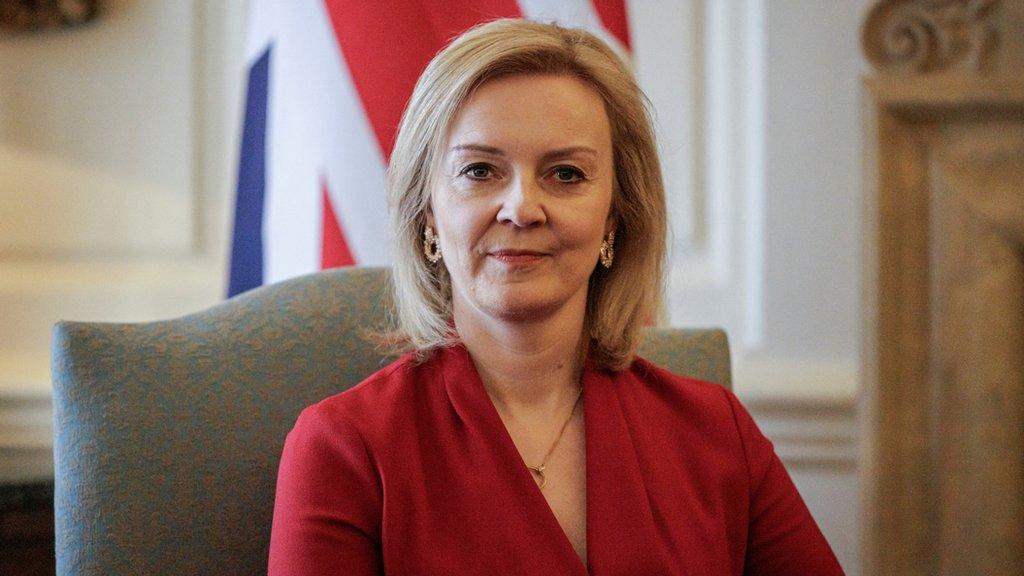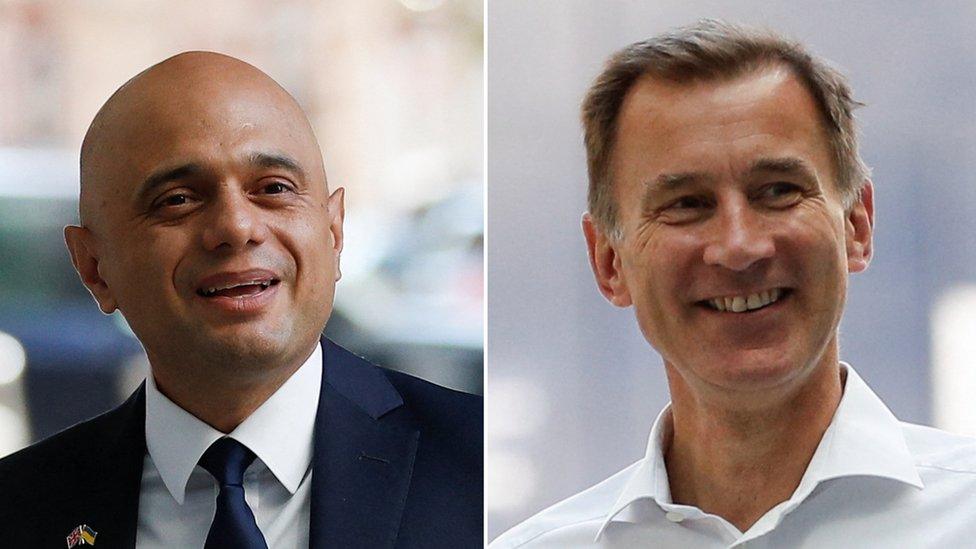Foreign Secretary Liz Truss joins Tory leadership race
- Published

Foreign Secretary Liz Truss has joined the race to replace Boris Johnson.
Declaring her plans in the Daily Telegraph, external, Ms Truss pledged to start cutting taxes "from day one".
Many of the 11 leadership hopefuls looking to become the Tory party leader have set out competing tax plans as a core element of their proposals.
Mr Johnson said he would not be endorsing anyone as his successor, as he preferred leaving the candidates to "get on with it".
The 1922 Committee of backbench Tory MPs which organises Conservative leadership contests will meet on Monday to decide the timetable and rules of the race.
The two-stage process will see Tory MPs whittle down the candidates to two, through voting rounds, before party members decide the winner to become new Conservative party leader and prime minister.
Ms Truss indicated that she would echo her rivals in planning to slash corporation tax, reverse the National Insurance hike and reform business rates.
She wrote that it "isn't right to be putting up taxes now" and if elected she would take "immediate action" to assist with living costs.
The foreign secretary said she would "fight the election as a Conservative and govern as a Conservative".
The candidates for Tory leader, and prime minister, who have declared so far are:
former equalities minister Kemi Badenoch
Attorney General Suella Braverman
newly-appointed Foreign Office minister Rehman Chishti
former Health Secretary Jeremy Hunt
former Health Secretary Sajid Javid
Trade minister Penny Mordaunt
Transport Secretary Grant Shapps
former Chancellor Rishi Sunak
Foreign Secretary Liz Truss
backbencher Tom Tugendhat
Chancellor Nadhim Zahawi
Home Secretary Priti Patel is also believed to be weighing up whether to run.
Speaking for the first time since he announced his resignation last week, Mr Johnson said: "The job of the prime minister at this stage is to let the party decide [its new leader], let them get on with it and to continue delivering on the projects that we were elected to deliver."
"Whatever happens and whoever takes over, there is a great, great agenda to be continued," he added.
Taxation has emerged as a key policy area for many of the candidates, but questions have been raised about how cuts will be paid for, and whether spending plans will be slashed.
'Brakes off'
Interviewed on BBC Radio 4's Today programme, Mr Tugendhat said he would be "looking to lower taxes across every aspect of society", adding that he had been "one of a few Conservative MPs who didn't vote for the National Insurance rise", which he called a "tax on jobs".
He said the UK needed to be "going for growth" - which he insisted could only be achieved by taking "the brakes off the economy" and boosting the private sector.
Mr Tugendhat also pledged to "deliver the benefits" of Brexit, saying he would open up trade agreements and change "the way we invest around the country".
Meanwhile, Mr Hunt told BBC Breakfast he would "get the British economy going", having served "at the coalface" by setting up his own business.
"We need to have a lower-tax environment to help businesses get off the ground," he added, which would include cutting corporation tax.
Mr Hunt said it was possible to do this "within our fiscal rules if we spread them over a five-year period, which means that our national debt continues to fall as a proportion of our output".
"And I think that's not just right; it's moral," he said. "We shouldn't be cutting taxes if we're loading up debts on future generations."
Mr Chishti also declared his candidacy on Sunday, speaking about the importance of lower taxes, a small state and a big society.
The abundance of tax-cutting plans announced so far, contrasts with Mr Sunak, who has played down the prospect of tax cuts before public finances improve.
The former chancellor released a video to launch his campaign, but is yet to set out his economic pitch.
He warned against "comforting fairy tales" that would "leave our children worse off tomorrow".

A scramble for support

This wide field of candidates could be narrowed down significantly within days.
Conservative backbenchers will meet on Monday to finalise the rules and timetable for the contest.
They're likely to set a relatively high bar for the number of confirmed supporters needed to enter the first round of voting among MPs.
The hopefuls will then have to scramble for backers before nominations close, likely on Tuesday evening.
A final two are expected to be chosen by the start of Parliament's summer break on 21 July.
Then it's over to the Conservative Party membership to pick the winner and our next prime minister.
Writing in the Sun,, external former levelling up secretary Michael Gove, who was sacked by Boris Johnson, has endorsed Ms Badenoch's campaign.

Business Secretary Kwasi Kwarteng acknowledged public spending cuts would be required if tax cuts were implemented, but refused to say which services would be affected.
"I'm not going to specify cuts at the moment because we've got a leadership contest and I'm sure the leadership contenders will spell that out more clearly," he told the Today programme.
Mr Zahawi, who became chancellor this week, joined the chorus of leadership hopefuls in calling for lower taxes in an fresh interview with the Telegraph, telling the paper "nothing is off the table".
Mr Zahawi - who has faced claims that his tax affairs have been investigated - also said he would publish his tax returns should he become one of the final two candidates in the race.
Experts have raised questions about the ability of a new prime minister to slash taxes without affecting public spending.
Paul Johnson, director of the Institute for Fiscal Studies think tank, said predictions of a budget surplus of about £30bn by 2024 had been calculated at a time when inflation predictions were lower.
Writing on Twitter, external, he added that using the headroom to fund tax cuts would "almost certainly" require public sector pay cuts or more borrowing.
"Everyone would like lower taxes. But [we] need to be clear about consequences," he added.
Meanwhile, Labour leader Sir Keir Starmer has taken aim at the leadership hopefuls for signing up to "unfunded spending commitments", describing them as taking part in an "arms race of fantasy economics".
He has also criticised them for now opposing tax rises introduced by Mr Johnson and Mr Sunak, after voting for them previously.

Watch Boris Johnson Quits: What Next & More Questions on iPlayer.

Related topics
- Published6 November 2022

- Published11 July 2022

- Published10 July 2022
